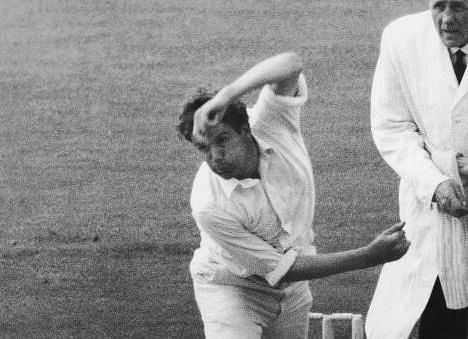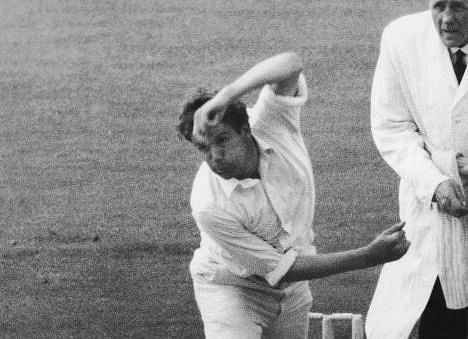
An interview with Harold Rhodes: Part one

Harold Rhodes
At a time when ‘great’ is used as an everyday term for most things from the modest upwards, it is a delight to be able to write a piece for the blog about a player whose career record defines greatness as it should be and the dictionary intends.
Harold Rhodes was an outstanding bowler for Derbyshire and almost certainly would have been for England, but for what was effectively a ‘witch hunt’ against him over a period from the late 1950′s onwards.
Harold had an elbow that hyper-extended. It wasn’t bent, like a dart player, as he let the ball go. His elbow actually went past straight, giving perhaps an extra ‘whip’ to the ball as he let it go in a classical style. His action was as smooth as gossamer, something a thrower could never manage in a million years of trying. He was quick, he was accurate and he jagged the ball around on a helpful wicket as well as any Derbyshire seamer has ever done.
Any bowler who finishes a career with over a thousand wickets at less than twenty runs each has got to have something special and anyone who saw him knew that he was just that. He was one of my first cricketing heroes; I wanted to bowl like Harold Rhodes and keep wicket like Bob Taylor, the stand out players in the Derbyshire side that I first saw in the late 1960′s. Sadly, in trying to play like one of them, I fell well short of the standard of both, but it didn’t stop me trying. Nor does it to this day, when my bowling is of a pace that I feel I could sometimes, if I chose to do so, go and stop a ball I’ve bowled before it reaches the batsman…
I was thrilled when Harold very kindly accepted my request for an interview, something that took me back many years to when I got his autograph at Chesterfield, as he left the field during a game against Yorkshire. I never imagined then that I would get an opportunity to question him on his career and I’d like to think that I handled it better than I did my encounter with him at that time. I’m not even sure I remembered to say ‘please’ when I asked for his signature, but he was kind enough to give it, something for which a nine-year old boy was very grateful.
I’m also grateful to him for his time in this interview. He is as lovely a man as he was outstanding a bowler and I hope that I have done him justice in this piece that will appear in several parts over the coming weeks.
If you, like me, were lucky enough to see him bowl, I hope it brings back a few memories. If you are too young and missed out, then believe old Peakfan when he tells you something.
Harold Rhodes was something very special indeed.
How did you come to join the Derbyshire staff?
Well, funnily enough – and this didn’t make it into the book on my career by John Shawcroft a few years back – I nearly joined Middlesex!
At the point where a decision had to be made on my future, Walter Robins, who was the chairman at Middlesex at the time, offered me terms to go and play at Lords. This was at the same time that an offer was tabled by Derbyshire and I had to think about it for a while. I’d played for the Club and Ground side and done well, which was where Middlesex had seen me in action.
I decided to show loyalty to my county, where my father had played with distinction over many seasons and I never regretted it. Over the years though, I have wondered if the controversy over my action would have reared its head had I opted to play at Lords.
In your youth you were a spinner like your father. What made you change?
I actually started out as an off-spinner. One day I was down at the nets and couldn’t bowl them, as I’d ripped the skin off my spinning finger and had Friars Balsam or something similar on it. Cliff Gladwin suggested that I bowl some leggies. I used to bowl leg-spin pretty well and could pitch it fine, but I didn’t have the googly that was so successful for my father in his career and you really need at top level.
At that time I used to bat 5 or 6 for the Club and Ground and actually made my debut for the county against Oxford University as a spinner, five weeks short of my seventeenth birthday! Then one day I turned up to play for the Club and Ground side and a trialist fast bowler’s car had broken down. Our coach, Denis Smith, asked me if I could bowl some seam to take the shine off the ball.
So I did – and it went well enough for me to decide to bowl quick. Denis thought I had a bit of pace and soon afterwards, chairman Robin Buckston sat me down in his Bentley and said that they wanted to take me on to the staff as a seam bowler. He also said that I should forget about batting and that I would be going in at ten from now on – just above Les Jackson.
How big an influence was your father on your career? Did you see him play regularly?
He encouraged me, which was the most important thing, and his connection with the club enabled me to practice with the ground staff when I was only 12 or 13. He got me playing for the Chaddesden Cricket Club, which was a good standard at that time and there used to be no end of people turned up for nets in the park. If you were late arriving, you didn’t get a bat! I had to walk a mile there and then again back home – I couldn’t afford a bike until I was 16.
I’ve seen a few references to you as ‘Dusty’ Rhodes, but always thought that nickname was the preserve of your father. Was that the case?
Yes, my father was called ‘Dusty’ by most people around the circuit for all of his days as a player and umpire, but only, to my recollection, the Yorkshire and Lancashire players used it with reference to me.
You came into a Derbyshire attack led by Gladwin and Jackson. That must have been quite daunting?
Yes, it was, but it was also a huge advantage. It showed me the temperament and the qualities that I needed to succeed and I count myself as very fortunate to learn from two such outstanding professionals and craftsmen. They taught me how important it was, on good wickets, to stop batsmen scoring, by bowling a good line and length. It built pressure and then batsmen made mistakes in trying to keep the scoreboard ticking over.
It still frustrates me when I see bowlers giving away a couple of ‘four balls’ an over, so the batsmen have only to wait and help themselves. I had a year as first change to Cliff and Les and it was a wonderful education. People took risks against me, because they’d not had a ball they could hit in the first hour or so.
Our scorer, Gilbert Ryde, came up to me at the interval in one of my early games and asked if I wanted to see the score book and check my analysis. Being well aware of my place in the scheme of things, I suggested that Cliff and Les should see it first.
“Oh, they know theirs”, he said. They both kept their bowling figures in their heads and at the end of a day were usually only a couple of runs out. I always did the same after that and encouraged any bowlers that I later coached to do the same.